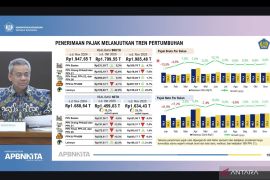In accordance with the Local Regulation No.8/2012 on Non-smoking Areas in government agencies, the local government is determined to protect the people from cigarette hazards in order to prevent them from being addicted to nicotine.
West Sumatra Deputy Governor Nasrul Abit stated in Padang that the local regulation has actually been in place since 2012, but it has not been adhered to effectively and now the rules will be seriously enforced.
According to him, to ensure that the rules are adhered to, the Civil Service Police Unit is assigned to monitor the implementation of the rules periodically, and violators will be directly processed in accordance with the rules.
Nasrul said the implementation of the Regulation of the Non-Smoking Area is to provide comfort to all government employees, especially non-smokers, by creating a healthy environment.
While for employees who smoke, he asked the Head of the Organization of the Regional Device (OPD) to prepare a special room for smoking. This is to ensure the effectiveness of work, because it is feared if they smoke out of the office, the work will be neglected.
In the meantime, governor`s circulars on smoking bans have been distributed to local government offices, places of worship, workplaces, children`s playgrounds, public transportation means, teaching and learning facilities, and health-care facilities.
Nasrul said the maximum penalty for violators is a five-month jail term and a fine of Rp50 thousand to Rp50 million.
Hence, the heads of the regional apparatus organizations and civil state apparatus are reminded to reduce smoking habit in the local government office environment.
They cannot be forced to stop smoking at all, but they are urged that if they smoke five packs a day, for instance, they can reduce them to about three packs a day, and sooner or later, they will be able to stop smoking at all.
People start smoking due to varying reasons, and once they get into the habit, it can be difficult to stop, as smoking is both physically and mentally addictive.
Hence, protecting the people from the dangers of cigarettes should continue to be strengthened without any intervention from the interests of the tobacco industry.
In fact, Jakarta Citizen Forum (FAKTA) Chairman, Azas Tigor Nainggolan, stated recently that the Indonesian government`s efforts to protect people from the dangers of cigarettes are still not strong, because of the intervention by the interests of the tobacco industry.
"With more vigorous campaigning by tobacco control group, the tobacco industry will also become more intense, especially since it has a lot of money," Nainggolan remarked in a discussion in Jakarta last Wednesday.
He noted that with resources owned, the tobacco industry can do anything, including "buying" policies and rules. Thus, it is not surprising that policies and regulations on tobacco control in Indonesia are still very weak.
"The rules have already been in place, but the implementation and rules derivative are still not strong," he noted.
He cited an example of a previous survey conducted by FAKTA some time before the development of non-smoking areas in government offices. Of the 150 government offices surveyed, it turned out that 90 percent violated the regulation at non-smoking areas.
In the meantime, a psychiatrist at the Soeharto Heerdjan Mental Hospital in Jakarta, Dr Adhi Wibowo Nurhidayat, has stated that nicotine addiction is highly dangerous and is ranked third among narcotics, psychotropics, and addictive substances, after heroin and cocaine addiction.
During a discussion forum in Jakarta on Wednesday, Nurhidayat remarked that addiction to nicotine, the substance contained in cigarettes, ranks after heroin and cocaine, but this is yet to be widely known to the public, and hence, it is not considered harmful.
Narcotics, psychotropics, and addictive substances are classified into two large groups, namely those prohibited for general use and those still legally allowed for consumption, such as alcohol and cigarettes.
Psychiatrists who have dealt with several cases related to addictive substances are of the opinion that low doses of nicotine offer a calming effect.
"It is the effect of addictive substances. They then eventually become addictive due to that calm feeling," he pointed out.
Nurhidayat explained that people smoking cigarettes are often aware of its negative effects, with its calming effect often becoming their excuse to continue the habit. Smokers often argue that they need to smoke in order to perform well at work.
The results of studies conducted by various parties indicated that active smokers would be more likely to stop smoking if the cigarette prices increase by at least twofold of the normal prices.
Indonesian Minister for Woman Empowerment and Child Protection Yohana Yambise had expressed concern over the increase in the number of child smokers in the country.
A total of 54 percent of Indonesian children are now smokers. Thus, the minister has vowed to wean away children and women from smoking, as it could cause lung cancer, miscarriage, cervical cancer, and heart problems.
The minister urged for a special rule to be put in place to save people, especially women and children, from the harmful habit of cigarette smoking.
Indonesia has set in place Presidential Regulation Number 109 of 2012 that bans children from smoking, but shops continue to sell cigarettes to them.
Yambise appealed to issue a regulation necessitating cigarette buyers to present their IDs to prove they are at least 18 years of age or above.
"The regulation must be in the form of a bylaw. Sanctions must be imposed against those selling cigarettes to children," she remarked.
The World Health Organization (WHO) has urged governments around the world to increase taxes on cigarettes and other tobacco products to save lives and generate funds for better health services.
According to the WHO, not many governments make full use of the tobacco taxes to dissuade people from smoking or help them to cut down and quit. It recommends that at least 75 percent of the price of a pack of cigarettes should be tax.
The WHO has found that one person dies from tobacco-related disease every six seconds or so, equivalent to some six million people a year.
(T.O001/A/KR-BSR/S012)
Reporter: Otniel Tamindael
Editor: Heru Purwanto
Copyright © ANTARA 2017












